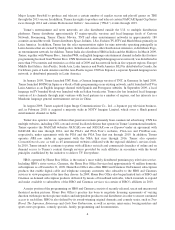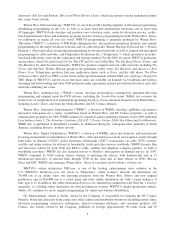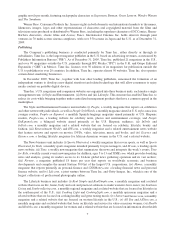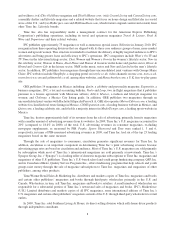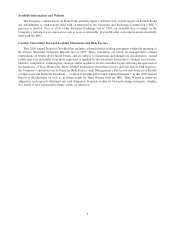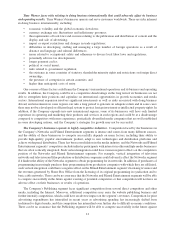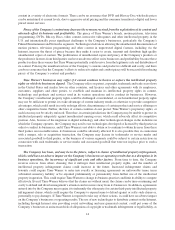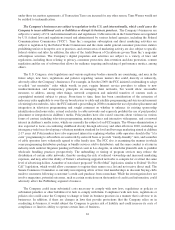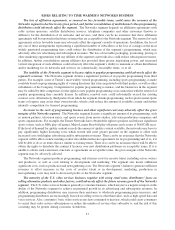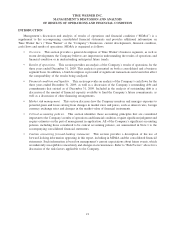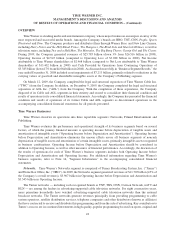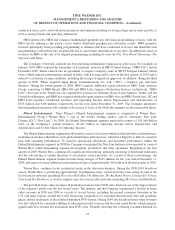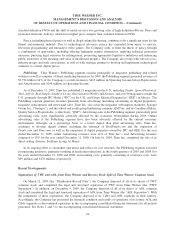Time Magazine 2009 Annual Report Download - page 26
Download and view the complete annual report
Please find page 26 of the 2009 Time Magazine annual report below. You can navigate through the pages in the report by either clicking on the pages listed below, or by using the keyword search tool below to find specific information within the annual report.content in a variety of electronic formats. There can be no assurance that DVD and Blu-ray Disc wholesale prices
can be maintained at current levels, due to aggressive retail pricing and the consumer transition to digital and lower
priced rental services.
Piracy of the Company’s content may decrease the revenues received from the exploitation of its content and
adversely affect its business and profitability. The piracy of Time Warner’s brands, motion pictures, television
programming, DVDs, Blu-ray Discs, video content, interactive videogames and other intellectual property in the
U.S. and internationally poses significant challenges to the Company’s businesses, particularly the Company’s
Filmed Entertainment and Networks segments. Technological advances allowing the unauthorized dissemination of
motion pictures, television programming and other content in unprotected digital formats, including via the
Internet, increase the threat of piracy because they make it easier to create, transmit and distribute high quality
unauthorized copies of content. The proliferation of unauthorized copies and piracy of the Company’s products or
the products it licenses from third parties can have an adverse effect on its businesses and profitability because these
products reduce the revenues that Time Warner potentially could receive from the legitimate sale and distribution of
its content. Policing the unauthorized use of the Company’s contents and products is difficult and costly, and there
can be no assurance that the Company’s efforts to enforce its rights and combat piracy will be successful in reducing
piracy of the Company’s content and products.
Time Warner’s businesses may suffer if it cannot continue to license or enforce the intellectual property
rights on which its businesses depend. The Company relies on patent, copyright, trademark and trade secret laws
in the United States and similar laws in other countries, and licenses and other agreements with its employees,
customers, suppliers and other parties, to establish and maintain its intellectual property rights in content,
technology and products and services used in its various operations and to conduct its businesses. However,
the Company’s intellectual property rights could be challenged or invalidated, or such intellectual property rights
may not be sufficient to permit it to take advantage of current industry trends or otherwise to provide competitive
advantages, which could result in costly redesign efforts, discontinuance of certain product and service offerings or
other competitive harm. Further, the laws of certain countries do not protect Time Warner’s proprietary rights, or
such laws may not be strictly enforced. Therefore, in certain jurisdictions the Company may be unable to protect its
intellectual property adequately against unauthorized copying or use, which could adversely affect its competitive
position. Also, because of the migration to digital technology and other technological changes in the industries in
which the Company operates, the Company may need to use technologies developed or licensed by third parties in
order to conduct its businesses, and if Time Warner is not able to obtain or to continue to obtain licenses from these
third parties on reasonable terms, its businesses could be adversely affected. It is also possible that, in connection
with a merger, sale or acquisition transaction, the Company may license its trademarks or service marks and
associated goodwill to third parties, or the business of various segments could be subject to certain restrictions in
connection with such trademarks or service marks and associated goodwill that were not in place prior to such a
transaction.
The Company has been, and may be in the future, subject to claims of intellectual property infringement,
which could have an adverse impact on the Company’s businesses or operating results due to a disruption in its
business operations, the incurrence of significant costs and other factors. From time to time, the Company
receives notices from others claiming that it infringes their intellectual property rights, and the number of
intellectual property infringement claims could increase in the future. Increased infringement claims and
lawsuits could require Time Warner to enter into royalty or licensing agreements on unfavorable terms, incur
substantial monetary liability or be enjoined preliminarily or permanently from further use of the intellectual
property in question. This could require Time Warner to change its business practices and limit its ability to compete
effectively. Even if Time Warner believes that the claims are without merit, the claims can be time-consuming and
costly to defend and divert management’s attention and resources away from its businesses. In addition, agreements
entered into by the Company may require it to indemnify the other party for certain third-party intellectual property
infringement claims, which could require the Company to expend sums to defend against or settle such claims or,
potentially, to pay damages. If Time Warner is required to take any of these actions, it could have an adverse impact
on the Company’s businesses or operating results. The use of new technologies to distribute content on the Internet,
including through Internet sites providing social networking and user-generated content, could put some of the
Company’s businesses at an increased risk of allegations of copyright or trademark infringement or legal liability, as
14


